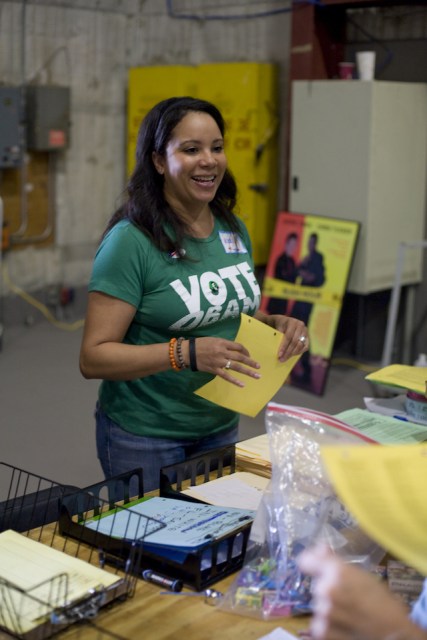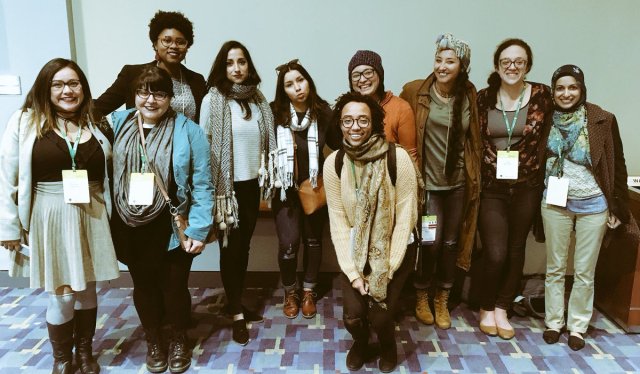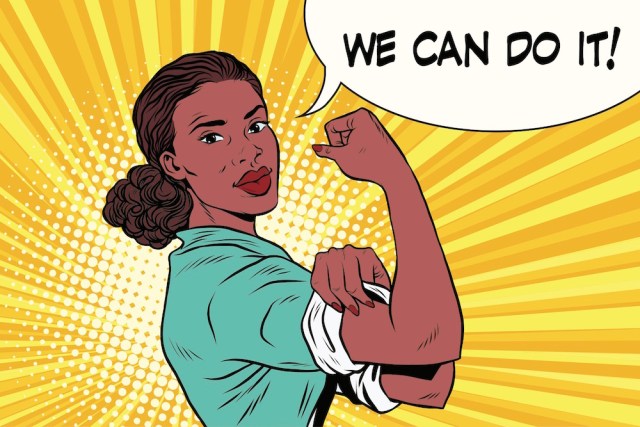feature image via Shutterstock
Welcome to Be The Change, a series on grassroots activism, community organizing, and the fundamentals of fighting for justice. Primarily instructional and sometimes theoretical, this series creates space to share tips, learn skills, and discuss “walking the walk” as intersectional queer feminists.
Well, hello, budding organizer! So, you want to move from the role of activist/participant to the role of an organizer/leader! Hells yes! Maybe you’ve been inspired by the incredible community organizers who put together the Women’s March on Washington or the queer women who started #BlackLivesMatter or maybe you’re just ready to fight back in a bigger way because what else do you do when everything is going up in flames. Whatever your motivation, welcome to the (not-super-awesome-wage, but really empowering and cool) party!
If you’ve been reading along, you’ll remember that I wrote a bit about what community organizing and grassroots organizing is back when I wrote about different types of petitions.
To recap, “community organizing” as a term and a philosophy of organizing is credited to Saul Alinsky in Rules for Radicals to describe a specific and tactical style of organizing to build “durable power” that is still used today. However, the term has grown to become a catchall for many different styles of organizing and mobilizing and activist work.
Ultimately, community organizing is about building power within a community to create cultural, political, and/or social change. It’s about influencing those with institutional power by building organized movements of empowered people with the goal of disrupting structural inequity.
There are many paths to becoming a community organizer and I’m going to lay our some basic tips here.
Here are some of the many possible jobs for an organizer:
- Door-to-Door Canvasser
- Political Strategist
- Legislative Advocate
- Grassroots Organizer
- Neighborhood Development Coordinator
- Advocacy Director
- Outreach and Engagement Coordinator
- Community Educator
Here are the main paths to becoming an organizer:
- Studying organizing in college
- Volunteering to gain experience
- Working for a nonprofit org that hires community organizers
- Attending a Professional Training
- Starting your own campaign/organization/movement
Study It

via Shutterstock
Community organizing is a specialized skill set. That said, it’s definitely not something you have to go to college to succeed at. Many organizers learn in the streets and on the job. Honestly, being out in the community is the best training there is, coupled with maybe reading some books and finding an awesome mentor/inspiration model.
You can choose to go to school to study majors or fields that pair well with a career in organizing, though. Here are some of the majors or degrees that would be helpful to a career in community organizing:
Undergraduate Degrees
- Political Science
- Public Justice/Criminal Justice
- Race/Ethnic Studies
- Social Work
- Women and Gender Studies
- Social Work
Graduate/Professional
- Law (J.D.)
- Master of Social Work (macro focus)
- Master of Nonprofit Management
- Master of Public Policy
Volunteer on a Campaign

Political campaigns and GOTV (Get Out the Vote) campaigns are a great way to meet people and build skills.
Many, many, many folks get their start by volunteer on a campaign. It’s a lot easier than it sounds to get started. Even if you live in a super rural area in the middle of nowhere, people are you are organizing and campaigning. Finding an issue or advocacy campaign may be more challenging the farther you get from a city center. Political and electoral campaigns, however, are literally everywhere.
Volunteering for a local political race — whether it be school board, mayor, city council, board of trustee, town supervisor, or a bigger state or federal position — is an awesome way to get your feet wet. You’ll be thrown into on-the-ground work, door-to-door canvassing and phonebanking and attending rallies and hitting the streets before you know it. If you really put the time in, you may even be hired as a campaign staffer or volunteer leader with just a little bit of experience and a lot of passion.
Nonprofit orgs and community activist groups are the place to find volunteer work on local issues (if you don’t want to start your own campaign). They’re almost always looking for committed volunteers with time to give and the interest in doing real work. Working with established organizers and groups means you benefit from their mentorship and experience and their existing expertise in the issue/campaign area. It will help you develop organizing leadership skills and network within your community.
A Note About Volunteering
It’s great to have the luxury of time to volunteer. Not everyone does. I just want to acknowledge that community organizing often doesn’t pay well and volunteering doesn’t pay at all. For some people, this is just out of the question. I don’t assume that everyone has the time to volunteer or to provide unpaid labor. I wish there were better ways to break into this field that didn’t require us to give free labor! I know it particularly disenfranchises those who are at the intersections of marginalization, who are also often those most impacted by the issues organizers are trying to remedy.
Get a Paid Gig

via Shutterstock
It’s hard to break into a job without experience, which is why volunteering can be a great way to start. It not only helps you build skills. It also helps you meet people who might lead you to an actual paid job in organizing!
That said, community organizing jobs don’t always require a ton of experience or a specialized degree. Many organizations are looking for skills above all else and many are also looking to hire people who are directly impacted by the issues that the organizer position will work on. Having deep connections as part of or with directly impacted communities is sometimes as important to a potential employer as having loads of experience or a degree.
Jobs in this field can be far and few between, however. Check the webpages of orgs near you that you’re interested in periodically. Local ACLU and Planned Parenthood affiliates tend to have a small advocacy or political affairs department, for example, as do many of the major union offices.
Organizing jobs are also posted to these sites frequently:
- Idealist – volunteer and employment opportunities with nonprofits
- Feminist Jobs Board by the Feminist Majority Foundation
- Organizers for America Jobs Board
Here are types of groups and organizations often hiring entry-level organizers:
- Grassroots Campaigns
- Public Interest Research Group (PIRG)
- Local Unions and Statewide Unions
- Political Races (tend to hire temp positions around election season – call your local party headquarters and check Craigslist)
Go to a Professional Training

via @rootscamp
A lot of these cost dollars and cents, but many offer scholarships and low-income options. Much like going to school for organizing, going to a professional training without any real world experience probably won’t get you the most bang for your buck. However, you may be able to find programs or workshops near you that are free or inexpensive and teach these same topics and tactics or local or state nonprofits that offer more affordable trainings near you. The trainings I’m listing here are heavy-hitters with national reach.
- Midwest Academy – teaches the Alinsky model
- Netroots Nation Conference – a national conference for digital organizers
- Wellstone – focuses on digital organizing and host of…
- Rootscamp – a participant-led “unconference”
Start Your Own Movement

via Shutterstock
Want to just get to it? There’s nothing holding you back from starting your own campaign right now. Read up about campaign plans and strategy. Go to a training if you can. Or, quite frankly, just go for it. Here are the basic things you need to lift a community organizing campaign off the ground. You want to create a campaign and an organizing framework that is sustainable and that has the power to win.
- Identify the Issue – What is the problem?
- Articulate Your Goals – What do you want? What would victory look like? What are your long, medium, and short-term goals?
- Identify the target(s) – Who has the power to give you what you want? (Targets are always identifiable human people, not “the government” or “the heteropatriarchy.”)
- Devise your strategies – What strategies will influence the target(s) to give you what you want? How can you grow and wield power?
- Come up with your tactics – What specific tactics will you use? A rally? A press conference? Educational meetings? Lobby visits? Petitions?
Put all this together and you have an organizing strategy and plan, the method by which you are going to get what you want from those who have the power by flexing your collective voice.
Community organizing invited you to go even farther than just thinking through an organizing plan. True community organizing engaged the community in building and growing the plan and in taking on leadership roles. So once you’ve considered the issue and what your general ideas for strategy are:
- Identify Others Who are Stakeholders and/or Directly Impacted
- Organize a Meeting
- Present Your Issue and Ideas to the Group
- Brainstorm and Strategize With the Group
- Identify Leaders Within the Group
- Develop a Campaign Plan (Goals, Targets, Tactics) Together
- DO THE THINGS AND WIN
Good luck! Share any wisdom you have or questions you’re curious about in the comments!



I’m so glad that Autostraddle has been encouraging folks to get engaged and involved with their communities, but I want to offer an alternative view to the (in my opinion) sanitized version of community organizing that’s presented in this column. I’ve been working as an organizer for a long time, with a lot of intensely local issues such as the threat of extractive industry, and also some broader issues like prisoner support and anti-racism. A few lessons and alternative viewpoints I’d like to share:
-You don’t need training to become a community organizer. Many folks don’t have training, but are motivated by an intense love of place and community and a desire for a better world. Also, there is absolutely no amount of training that will give you the knowledge of the community you’re trying to organize in, and this knowledge and depth of understanding is critical in having people trust you and being able to mobilize folks. Act local.
-Many people I know are mistrustful of paid organizers or organizers from the major political parties, or affiliated with mainstream politics. While I get the point about not everyone being able to provide unpaid labor, at least in my area there is a long and beautiful history of folks, especially marginalized folks, pouring their time and energy into the work (for free!) because there’s nothing more important than protecting our community and our landbase. Beware people who declare themselves organizers and then show up a couple of times a year to pose in front of cameras.
-Organizing is messy. The things we are fighting against often have many, many more tools and resources at their disposal, and so there is not necessarily a single campaign or strategy that will be effective. Honor a diversity of tactics. Most of the folks I organize with come from an anarchist perspective, so there’s also not necessarily a need to declare “leaders”-working from a non-hierarchical perspective generally enriches the community and allows for the diversity of ideas and skills that are necessary for grassroots movements.
Even though I’ve been doing this work a long time, I still don’t feel at all that I “know what I am doing”-and most people don’t. But don’t let that hold you back from trying! You’ll learn along the way, and don’t feel like you need to align yourself with mainstream politics in order to make a difference in your community and fight the good fight for the things that matter! <3
Yeah. I personally disagree with you about the need for paid organizers and lack of hierarchy. But I agree that this is presented in a very sanitized, almost de-politicized way. Something rather professional-class/middle-class about it all. I guess that’s autostraddle’s reader base. But you need to think about it when you’re, yknow, fighting the class war.
Yeah, for sure. I didn’t put a lot of specifics in about my positions on paid organizers or leadership for clarity and length, but I’m always interested in alternative perspectives, so I’ll expand a little bit here.
I’m not against paid organizers per se; I know that organizing is emotionally and physically grueling work, as well as extremely time-intensive. And I think that generally, people deserve to be paid for their work. The issue I and at least the other folks that I work with on community issues run into is that there is no funding source to pay anyone to do the work that we feel is necessary and right. It’s easy(ish) to find paid work doing the normal political stuff-door to door campaigning, phone banking, rallying voters, getting people to engage with elected officials, etc.,–but it’s pretty much impossible to find someone to pay you to do prison abolition work or to train folks on non-violent direct action against extractive industry, for example. So while I wish people could be paid we have not yet found a funding stream that pays for the work we want to see done. And I don’t think that organizing should be seen as a resume-builder or “career opportunity”-I have mad love and respect for the folks that are out there doing it, every day, just because it’s important.
-In terms of leadership, a non-hierarchical organizational structure has worked for us very well in the past. I love bringing everyone that’s interested in the community together and seeing what sorts of different viewpoints and plans of action shake out! In some movements, some natural “leaders” have emerged that act as spokesepeople and motivators, but decisions were still made by the community and for the community, and people are welcome to act like the autonomous beings they are and take the actions they feel are necessary. This can definitely sometimes lead to friction and division in movements, which is a challenge for sure, but I think these are important conversations and experiences for movements to have in order to be successful.
But, I also know that what works for some people and places doesn’t work for everybody, so I’d love to hear more about you perspective and experiences!
I just want to say I don’t disagree with your points at all, @courtneyquixote. I tried to make that clear by including various paths and continuously stating that you don’t need formal education or training to get started. Maybe I should have started with, “Start Your Own Movement” and put these things in reverse order.
Typically, when someone comes up to me and wants to know how to become an organizer, they’re looking for practical tips like this on where to volunteer or build skills. “Community organizing” as a theoretical term specifically aligns itself with the (somewhat neoliberal) Alinsky model, but I personally support a more true grassroots and decentralized theory of change-making, as well. Some of the most powerful movements and groups embrace those non-hierarchical models. And I see those groups and individuals at odds with nonprofits who embrace a more liberal model in my work all the time. (I also personally have a lot of issues with the nonprofit industrial complex, even as I struggle to make change from within it, but that’s a whole other essay.)
If there are resources you think I could point to for people interested in different organizing practices/theories, please post them so I can include them. Mostly, I want people who are interested to feel like they have a point of entry into doing this work beyond showing up for rallies and making phone calls. <3
Additionally, I have seen lots of groups popping up since the election that are “just doing it” and doing a really crappy job with intersectionality. I do think it’s important to acknowledge the people and movements, particularly those directly impacted and doing organizing in their own communities, and to work to amplify those voices. Unfortunately, many middle-class-ish new activists don’t do this work and jump right into the tactics and the do-ing without being thoughtful about intersectionality. I think doing organizing within your own community is very different than doing it from outside of it.
Anyway, thanks for sharing these additional points. They’re helpful and I also support a diversity of tactics. Let’s keep it up. :)
I’m loving Be the Change! I appreciate that the post and Courtney both mention that anyone can organize, but I learn toward recommending training – especially because it’s worth learning about what *doesn’t* work so that you don’t spend your energy repeating someone else’s mistakes.
If training’s what you’re into, or you just like supporting queers making a difference, please checkout the Kickstarter called Small Towns Rising. I’m a supporter, and it’s about training new activists in the fight for inclusion, love, and justice. The creator and lead is queer, too, so bonus.
https://www.kickstarter.com/projects/1744290437/small-towns-rising
Thanks for this great post!